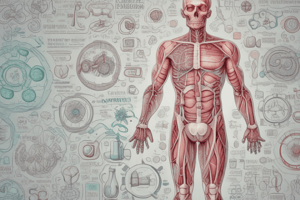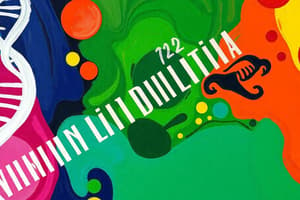Podcast
Questions and Answers
What is the main role of Vitamin B12 in the body?
What is the main role of Vitamin B12 in the body?
- Prevention of heart diseases
- Formation of red blood cells (correct)
- Synthesis of proteins
- Formation of neurotransmitters
Which biological process does Vitamin B12 NOT contribute to?
Which biological process does Vitamin B12 NOT contribute to?
- Formation of nerve tissue
- Synthesis of neurotransmitters
- DNA synthesis
- Production of ATP (correct)
How is Vitamin B12 absorbed by the body?
How is Vitamin B12 absorbed by the body?
- Through the pancreas
- In the presence of pepsin
- By diffusion through the large intestine
- Via binding to intrinsic factor (IF) (correct)
What is the primary function of Vitamin B12 in methylation?
What is the primary function of Vitamin B12 in methylation?
Which process does NOT involve Vitamin B12 in its metabolic role?
Which process does NOT involve Vitamin B12 in its metabolic role?
Which health problem is commonly associated with vitamin B12 deficiency?
Which health problem is commonly associated with vitamin B12 deficiency?
What are some of the neurological changes that may be experienced by individuals with vitamin B12 deficiency?
What are some of the neurological changes that may be experienced by individuals with vitamin B12 deficiency?
How can vitamin B12 deficiency affect the gastrointestinal system?
How can vitamin B12 deficiency affect the gastrointestinal system?
What is a significant cardiovascular complication associated with elevated homocysteine levels caused by vitamin B12 deficiency?
What is a significant cardiovascular complication associated with elevated homocysteine levels caused by vitamin B12 deficiency?
Which of the following is NOT a common cause of vitamin B12 deficiency?
Which of the following is NOT a common cause of vitamin B12 deficiency?
Flashcards are hidden until you start studying
Study Notes
Vitamin B12: Functions, Metabolism, and Deficiency
Functions of Vitamin B12
Vitamin B12, also known as cobalamin, plays a crucial role in maintaining overall health and preventing specific medical issues like anemia and neurological damage. It serves as a vital component in numerous biological processes, particularly in the formation of red blood cells, nerve tissue, and DNA synthesis. Additionally, it helps maintain proper brain function and prevent heart diseases.
Metabolism of Vitamin B12
Vitamin B12 is absorbed by the body through a process involving hydrochloric acid and intrinsic factor (IF), a protein secreted by parietal cells in the stomach. This vitamin binds to IF and forms a complex called "vitamin B12-IF", which allows it to pass through the wall of the small intestine and enter the bloodstream, where it can be stored in the liver and other tissues.
Inside the body, vitamin B12 is utilized in three main roles:
- Methylation: Converts homocysteine to methionine, a critical amino acid involved in the synthesis of neurotransmitters, hormones, and proteins.
- Transmethylation: Plays a significant role in the remethylation of methionine to homocysteine, which is converted back to methionine via transulfuration.
- One-carbon metabolism: Contributes to the conversion of N5-methyltetrahydrofolate to tetrahydrofolate, an important step in the recycling of carbon-containing compounds in the body.
Deficiency of Vitamin B12
Deficiency of vitamin B12 can lead to a wide array of health problems, including the following:
- Anemia: It causes megaloblastic anemia, characterized by large, abnormally formed red blood cells.
- Neurological changes: People with vitamin B12 deficiency may experience symptoms like numbness, tingling, mental confusion, memory loss, depression, and balance difficulties.
- Gastrointestinal disturbances: Digestive problems can arise when there is poor absorption of nutrients from food.
- Cardiovascular complications: Elevated homocysteine levels are linked with an increased risk of heart disease.
The causes of vitamin B12 deficiency include genetic disorders, such as pernicious anemia or Imerslund-Gräsbeck syndrome, along with malabsorption syndromes, gastric surgeries, or usage of certain medications that interfere with absorption.
Studying That Suits You
Use AI to generate personalized quizzes and flashcards to suit your learning preferences.




